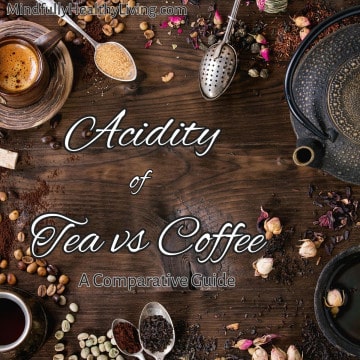If you have been to the dentist recently, you may be wondering whether you can drink coffee with a temporary dental crown. You have come to the right place!
The short answer is yes, coffee should be safe to drink as long as you wait 30 minutes after the procedure and sip slowly. Be extra mindful of sensitivities to temperature as you enjoy your food and drink immediately after any dental procedure.
Additionally, it is important to be aware that dark-colored beverages and foods may stain your crown.
Jump to:
I have had many personal experiences with dental procedures. However, as a holistic nutrition specialist, I can recommend nutritional supplements that have helped myself and others. However, it is advisable to consult a dentist or doctor before making any changes to your dental or healthcare routine.
The Necessity of Prompt Dental Care
Dental treatments can be a necessary part of life. Even with good oral hygiene, tooth decay can still occur. If you experience severe pain, have a damaged tooth, lose a filling, or break a permanent crown you may need to see an emergency dentist or make a dental appointment ASAP.
After your visit, you will likely understand the importance of practicing the proper care after your dental procedure.
Some dental restorations and procedures that require special aftercare include temporary filling, permanent filling, dental bridge, temporary dental crown, and permanent dental crown. The recovery times for these procedures are typically minimal but may require you to take some precautions with the food and drink that you consume in the following days.
What Happens When I Get a Crown?
Crowns may be placed when a tooth is very brittle but still has a strong root. Dentists will also place a crown after performing a root canal treatment to “save the tooth”. The alternative to a root canal with a crown is usually to extract the tooth or place dental implants.
Needing to replace the tooth happens because decay reaches below the gum line into the nerve root of the tooth. Unfortunately, this means that the dentist would be unable to resurface the cavity with a traditional dental filling. The deeper decay will need to be removed and/or replaced.
Once your dentist prepares the tooth to receive the crown with a post (either with your natural tooth or a stainless steel post) they will prepare your tooth for a crown. (source)

Preparing the Crown
Afterward, the dental team will make impressions of your teeth and match a color to your natural teeth to send to the dental lab to create your permanent dental crown.
This process may take 2-8 weeks depending on the dental lab. In order to prevent further damage and protect the sensitive area and posts, the dentist will clean the area and give you a temporary tooth crown using temporary cement.
The temp crown is a tooth-shaped cap. This cap may not be as comfortable or aesthetically pleasing to you as your permanent restorations will be once the crown comes back to your dental office from the lab. Nevertheless, it will be worth it to fill in and protect the space where your damaged tooth once was.
Proper Care
After receiving your temporary crown, you will likely receive discharge care instructions from your dentist. Your dental care team will likely ask you not to eat or drink anything for 30 minutes or up to 2 hours after your visit.
Taking good care of your temporary crown will ensure a smooth first visit back to the dentist when you receive your new tooth.
If you experience tooth sensitivity you may want to avoid extreme temperatures from hot or cold foods or drinks.
You can gently swish with warm salt water rinses to help heal swollen gums and sensitive areas after your procedure.
You can also use desensitizing toothpaste to help with the pain.
Chew soft foods- with care. Do not put too much pressure on the newly placed tooth. If you chew harder foods like crunchy vegetables, do so on the opposite side of the mouth.
Do not eat hard candies, jelly beans, or other chewy foods as the sticky nature of the food can dislodge the temporary restoration. (source)

Hot and Cold Drinks
Try not to drink cold or hot drinks if you are experiencing sensitivity. Feel free to enjoy your beloved cup of coffee after the first 30 minutes to 2 hours (per your doctor's instructions).
While alcoholic beverages should be avoided 24 hours after a surgical operation such as an extraction to avoid dislodging the blood clot, they should be fine after the placement of a crown. Be aware that similar to coffee, red wine may cause your crown to stain.
Brushing and Flossing
Brush your teeth and crown normally, with a soft-bristled toothbrush. Be careful not to floss around the temporary crown, as it may cause the cap to fall off. If the crown falls off, bring it to the dentist to clean and replace it. Once you get the permanent crown, it is important to floss gently with a pulling motion and avoid abruptly pulling the floss straight down. Over time, continual flossing in this way may result in the crown popping off and needing to be cemented in again or repaired by the dentist.
Natural Ways to Care For Your Teeth
We can all agree that proper dental hygiene is important for everyone.
Brushing and flossing with a healthy non-toxic remineralizing toothpaste is extremely helpful in preventing cavities. Hydroxyapatite is a wonderfully helpful remineralizing toothpaste to replace fluoridated ones with other unhealthy and processed ingredients.
 Wellnesse Whitening Toothpa...Shop on Amazon
Wellnesse Whitening Toothpa...Shop on Amazon
Strengthening teeth from the inside out is also just as important! A healthy diet of natural and clean ingredients rich in vitamins and minerals is crucial to healthy bones, teeth, hair, skin, and nails.
Reducing your phytic acid intake can greatly help preserve the integrity of your teeth. Phytic acid is an anti-nutrient that is naturally on the outside of grains, nuts, seeds, and legumes to protect the food from the elements and insects as it grows. You can sprout, soak, and rinse these foods in warm water and a splash of apple cider vinegar to reduce and remove the phytic acid.
When ingested, phytic acid interferes with the absorption of vital nutrients and minerals. This creates an acidic environment in the body.
Over time, the body begins to pull these nutrients from the body including the bones and teeth. It does this as a self-preservative measure to maintain its crucial alkaline pH in the blood.
Soaking and sprouting your grains, nuts, legumes, and seeds greatly reduces phytic acid levels, which allows the body to absorb the nutrients necessary from food. Gold!
Consider Oil Pulling
Using unrefined coconut oil, swish with one small teaspoonful for 15 minutes first thing in the morning. Spit the oil into the trash when done to avoid plumbing issues. Use a tongue scraper immediately after. Rinse with salt water and brush as usual. This simple process helps to prevent dental cavities, strengthen teeth, improve gum health, restore a healthy microbiome of the mouth, and much more.
 Viva Naturals Organic Cocon...Shop on Amazon
Viva Naturals Organic Cocon...Shop on Amazon
Consider Black Walnut Hull Tincture
Black Walnut Hull tincture. Swishing with the black walnut hull in water can greatly improve pain from sensitive teeth as well as assist in remineralizing teeth and restoring enamel due to its impressive mineral profile and natural tannins. Take one dropper full of at least an ounce of water. Swish for a minute and then swallow. Do this for no more than 3 weeks in a row and take a break.
*Note: Walnut Hull is dark-colored and can cause stains on dental crowns.
Clove bud oil is a helpful remedy for temporary dental pain as it works well as a natural antiseptic and local anesthetic.
 Organic Clove Essential Oil...Shop on Amazon
Organic Clove Essential Oil...Shop on Amazon
When making your favorite cup of coffee, be sure to reach for low-acid organically grown coffee beans free from mycotoxins. This will help many systems in the body including your teeth and bones. As mentioned above, acidic foods can wreak havoc on our bodies and especially our teeth. Check out this list of healthy coffee brands.
 Lifeboost Coffee Organic Co...Shop on Amazon
Lifeboost Coffee Organic Co...Shop on Amazon
 Lucy Jo's Coffee, Organic F...Shop on Amazon
Lucy Jo's Coffee, Organic F...Shop on Amazon
 Puroast Low Acid Coffee , G...Shop on Amazon
Puroast Low Acid Coffee , G...Shop on Amazon
As mentioned before, we also highly recommend brushing with hydroxyapatite toothpaste as it is a natural and non-toxic alternative to fluoride.
It is amazing how many natural remedies we have at our disposal. These are a brief few of our favorite, most helpful holistic oral health tips.
Follow us for more naturally healthy information. We share healthy clean eating recipes, nutrition tips and tricks, supplement and superfood highlights, and mindfulness techniques for all-around wellness.
Thankfully, by waiting the right amount of time after having your dental crown procedure and choosing the right low-acid coffee, you can still enjoy your favorite beverages while maintaining good oral health!
Enjoy your coffee! 😉
Natalie







Comments
No Comments